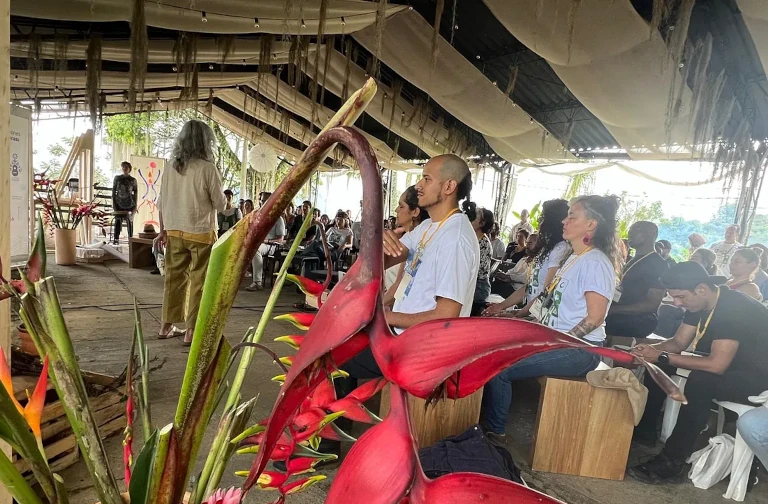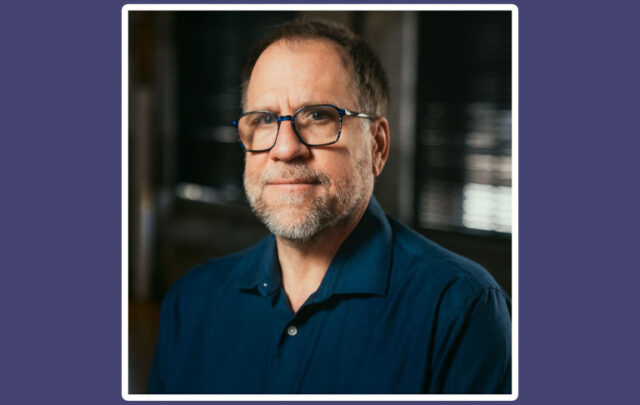Seven Observations On 2024 and What’s Next
In 2024, over 2 billion of us voted in national elections. So what have we learned so far this year, in general and from the US election in particular?
In the seven observations & reflections below I offer some of my own initial sensemaking as part of a broader conversation happening now. These points reflect my own experiences from a viewpoint of awareness-based systems change: the idea that for deep change to happen, we need to focus not only on the social systems “above the ground”, but also on the deeper conditions of social soil (figure 1). When people talk about social systems they usually refer to the observable and tangible (processes, procedures, structures, behavior patterns). But what I mean by social soil are the less visible inner conditions, what is beneath the surface, the quality of awareness (attention and intentions), and the quality of relationships that affect how we operate. The social field, the sum total of our relationships, is a combination of these two elements: social systems and social soil.
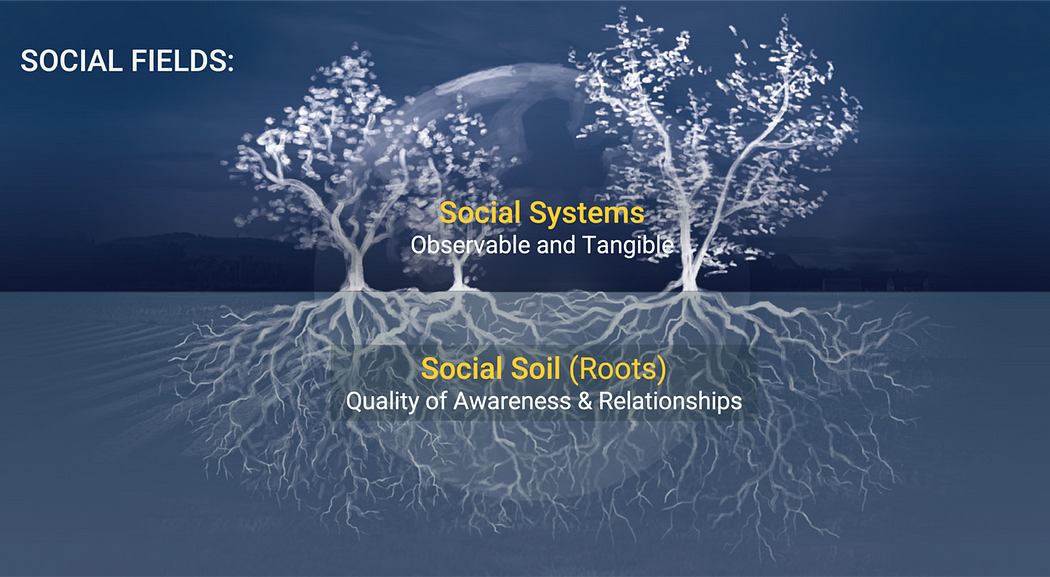
Figure 1: Social Field = Social Systems + Social Soil (Source: Scharmer and Kaufer 2025)
An earlier version of this reflection will be published in the Humanistic Management Journal (special issue on Awakening to One Another and the Earth: Awareness Practices and Systems Change).
1. DINO (Democracy in Name Only): The Unholy Alliance of Dark Money and Dark Tech
Some of the key trends in recent elections around the world can be summarized in three points:
- More than 90% of people support democracy.
- More than 50% are also willing to vote for populists who promise real change, even if that includes the undermining of key democratic institutions.
- Most people, if given the choice, do not vote for autocratic forms of governent. Case in point: India, where Prime Minister Narendra Modi lost his majority and now rules with a coalition.
From this perspective the recent US election was not an outlier. Broadly speaking, incumbent parties in developed countries lost voter support in all elections this year. People want to see real change. One candidate, Trump, ran on a platform that promised just that. The other one, Harris, fully associated herself with continuing the status quo, even though 66% of Americans live from paycheck to paycheck and the US continues to support the genocidal war in Gaza (that has killed over 43,000, including 30,000 women and children to date).
The election results do not suggest that the majority of Americans want to live in an autocracy. In fact, only 1.8 million more people voted for Trump in 2024 than did so in 2020, a relatively modest gain. More interestingly, about 8 million fewer people voted for Harris than for Biden in 2020. The very unusual fact that many Americans opted to not vote for any of the national candidates while still casting votes for down-ballot candidates in their respective local elections suggests they were highly frustrated with the two options presented to them.
What does that tell us about democracy? Democracy is under strain globally, with mass misinformation eroding citizens’ ability to perceive and respond to the realities they face.
Mass polarization prevents critical conversations about the shared concerns we are facing as a community. Societies that lose those foundations of democratic functioning are either disintegrating or heading toward the edge of a cliff.
In other words, democracy is under attack. There are two primary forces responsible for undermining the democratic process, particularly in the US: One is “dark money” (Mayer 2016): money used in ways that the public cannot see and that de facto shapes and manipulates the priorities and platforms of the respective candidates. The other one could be called “dark tech”: technology used in ways that the public cannot see and that shapes and manipulates the viewpoints and voting behaviors of the citizens. While dark money is contaminating the supply side of politics (agenda and political platform creation), dark tech has a similar impact on the demand side of the democratic process (citizens’ perceptions and preferences).
What we are seeing is a democracy whose soil is being degraded. You could call such a system DINO, democracy in name only, because a democracy without a grounding in facts and public conversation is not a democracy. In the language of the figure 1 above, its soil and root systems are being degraded.
2. It’s difficult to listen when your funding depends on not listening
The second observation follows from the first. What happens to politicans who need to spend at least half of their time fundraising in order to stay in office? They end up mingling with billionaires and their surrogates. In other words, they have very little time to listen to their constituents, the people they’re elected to serve. Listening to and engaging in dialogue with citizens represents, needless to say, the soil and roots of any democratic process.
The Democratic Party, and with it the Harris candidacy, are a stunning embodiment of not listening. If your primary instinct is to avoid mistakes, follow the guidance of the consultants around you, and not engage with people whose belief structures you abhor, then of course you will easily lose many young voters. Not moving an inch on the US-supported bombing of Gaza is just one example of a stubborn failure to engage. If then you add to that currying favor with the Cheneys (knowing that many consider former vice president and secretary of defense Dick Cheney to be a war criminal), you’ll also lose the support of the young voters’ parents and grandparents.
But what’s more important is what the Democratic campaign chose to not talk about: Why wasn’t there more acknowledgment of the many Americans that are hurting? Why was healthcare for all dropped from the Harris platform? Why do we have to continue funding and extending highly unpopular wars? Why can’t we put guardrails on AI and social media that protect the wellbeing of all?
All these potential campaign issues would have been highly popular with the American electorate. The silence on those topics is not hard to explain. It’s difficult to create a platform that represents the true priorities of the American citizens if your ability to raise a billion dollars depends on not listening to them, but on listening instead to Big Tech, Big Money, Big Pharma, Big Oil, the military-industrial complex, and the billionaire class.
Thus, my second observation is simply this: the campaign of the Democratic Party (not just Harris) lost touch with the majority of the country that lives outside its political bubble. In other words, it didn’t listen. If you don’t listen deeply to the electorate, you won’t feel them, and when you don’t feel them, your campaign won’t resonate with anyone outside of your professional progressive orbit.
3. It’s the Economy
It’s the economy, stupid. That reminder from past political campaigns proved true once again. Voters didn’t want to be lectured about why they should feel good about an economic reality that has created hardship for many. They wanted to be listened to. Taken seriously. And addressed in ways that make them feel heard and valued by the platform priorities and the candidate. It’s probably not accidental that the recent conversation on reducing global emissions and addressing climate destabilization (the COP process) has been coming to the same conclusions: the more we move from agreements and promises to actually delivering on them, the more the focus shifts from governments to business and to cross-sector alliances that work collaboratively on accomplishing these ambitious targets and objectives.
When you ask change makers in the growing group of (semi-)autocratic countries what they do when civil society is under attack, what do they say? They say that you turn your attention to business and to education as key vehicles for generating meaningful impact and work.
Business as a force for good will be one of the most important go-to places in the coming years. Business is the only place in society where the whole production function comes together. All other sectors — including NGOs and governments — just talk about it. But in business it actually happens. If the EPA is dismantled from within, and governmental regulations are gutted by firing all people who could enforce or implement them, which in the US is now just a question of time — then what? Where do you go if you want to make a positive difference? You go into local and state politics, you go into education, and you go into business, you create mission driven enterprises that can work together as a force for good.
The main point of this set of observations is simple: economic transformation will be absolutely key for positive societal change in the years and decades to come. From this angle we can see the US election results as a stinging critique of recent progressive movements. What did many of these progressive movements end up doing? Creating new cultural norms and new government regulations. Some of them are essential. Some of them perhaps a bit over the top. But what’s often missing? The perspective of the makers, the frontline professionals who must operate inside ever-growing straightjackets of regulation and bureaucracy. When you talk to doctors, teachers, farmers, developers, builders, or bankers of small socially responsible banks — in short, to anyone who is actually doing stuff to create economic prosperity and value — you begin to see the growing disconnect between our ever-growing bureaucratic requirements on the one hand and the lived reality of people and professionals.
So what’s the late 2024 message for systems change? In the US, many of these systems will likely be dismantled from within. Environmental regulation. Financial regulation. Labor regulation. Basic human rights. You name it. It will turn the clock back at least to some degree, and as a consequence, we will see completely unnecessary suffering. What, then, is ours to do? What can we do to continue working for the change that we all want to see?
Perhaps one important answer may be this: a shift of primary focus away from top-down — regulating the change that we want to see — toward bottom-up: co-generating and embodying the change that we want to see. Instead of government being the primary instigator of societal change, businesses, civil society, and leaders across institutions must choose to work together around shared intentions and concerns, in the form of a bottom-up ecosystem and movement. Obviously, the choice is not either-or. But the primary emphasis of change making will shift toward building collective capacity for bottom-up cross-sector innovation and transformation across places and regions. At the end of the day, what happens in politics is shaped by social movements and sentiments, and what happens in these movements is shaped by what happens on the ground, by our capacity to create living examples of what we want to see locally, regionally, and beyond.
4. There Is a Third Option
When I went to vote this month, it seemed I had a choice between two options: “not” and “again”. (1) ‘We are not going back.’ And (2) ‘Making … great again.’ The last word is the most important one in that slogan.
So what’s wrong with that? One option is stuck in the status quo. The other one suggests to disrupt the status quo by going backward.
What’s missing obviously is a viable third option that would disrupt and transform the status quo by leaning into and operating from an awareness of the emerging future. Many movements for planetary healing and societal regeneration operate with the emerging future in mind — and it’s a movement that inherently is not left or right. Leaning into, sensing, and actualizing the emerging future is orthogonal to those 20th-century political categories — meaning that it is independent of these older sets of distinctions.
Figures 2 illustrates this by depicting two different ways of operating: with minds, hearts, and wills that are either open or closed.
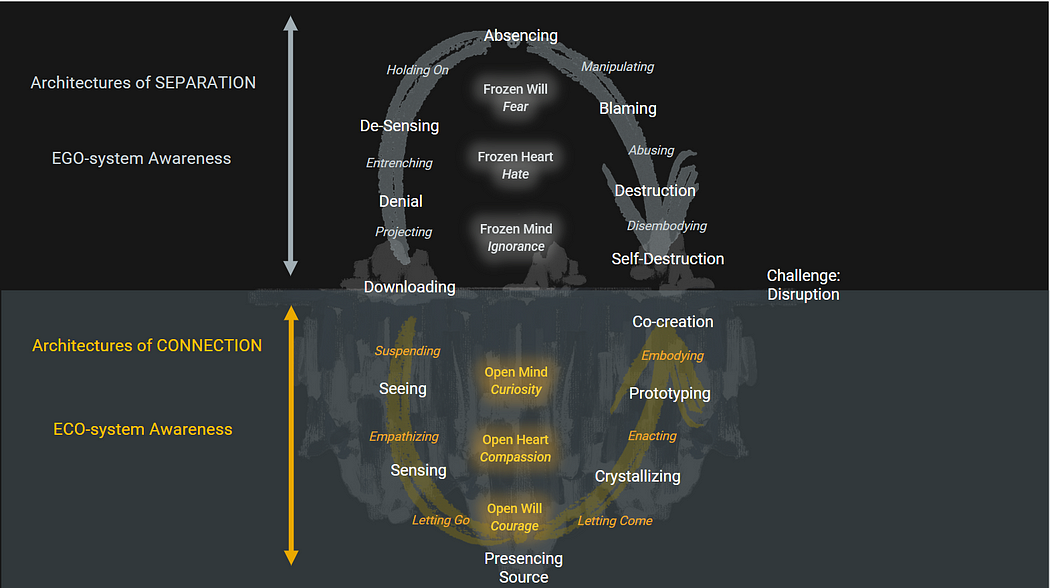
Figure 2: Two Cycles, Responses to Change: Absencing and Presencing
All the above is a long way of saying this: this month’s election will result in a massive amplification of the cycle of absencing (depicted in the upper half of figure 2) for all the obvious reasons: more denial (climate denial, denial of how the majority of mankind-outside of the US-Euro bubble-looks at the wars in Gaza, in Ukraine, etc), more de-sensing (polarization and othering through mass deportations and political retribution), more blaming of others (immigrants, communists, universities), and more destruction of nature, of trust in our institutions and into each other, and destruction of human wellbeing (mental health) and human life (wars). It is on the last point where the Trump administration might perhaps offer a different approach to the existing foreign policy strategy of the State Department, that over the past few years has misled our Ukrainian friends into a proxy war of attrition that has destroyed large parts of the country and amounted to human costs of over a million people (dead or injured) for absolutely no gain and for only strengthening the military-industrial complex in the West and the Putin autocratic grip in Russia and the East (Sino-Russian alliance) that is now much stronger than it was at the beginning of the war. Biden’s weekend decision to now allow long-range missile attacks deep into Russia with US missiles can only be described as completely irresponsible.
In summary, we are now moving into a period that will see many institutions gutted or dismantled from within. To what degree that happens will depend on many factors. But on the flipside, we may also see the awakening of an awareness that cuts across old political lines, where leaders and citizens in communities begin to work together and spontaneously organize around common sense and common interests. A lot will happen locally, in cities, states, in companies, and regions. A lot will happen spontaneously, without formal coordination but inspired by a shared civic responsibility — as we saw in surprising ways during the first Trump term, when the institutions were bending but not breaking. The human spirit has a way of showing up in ways that linear thinking often can’t anticipate.
5. Islands of coherence can combat the illusion of insignificance
So what’s next? Where do you find the seeds and shoots of the new? Just like in nature, they emerge and grow within the context of the old system, and they are visible in the form of living examples around the world. There are three main barriers that prevent them from growing and being replicated: the illusion of insignificance; lack of connection; and lack of courage.
The illusion of insignifance is the belief that the actions of an individual or small group can’t change the larger system. And yet, real change is almost always composed of many small actions. In that context I have found the following words of the late Nobel laureate Ilya Prigogine to be quite helpful:
When a system is far from equilibriumsmall islands of coherencein a sea of chaos have the capacity to lift the entire system to a higher order.
Prigogine articulates the idea of bifurcation points in non-linear systems, the time when small changes can generate big changes by tipping the system in one direction or another. I believe that the smallest “island of coherence” is in realigning attention and intention. Our attention, if aligned with intention, can radiate clarity and begin to catalyze agency (that is, action that actualizes our best future potential).
Of course, the “in a sea of chaos” part will not be in short supply, as we move into a period of governance by chaos. It’s in that context that we need to develop the capacity to create islands of coherence that activate our agency, both individually and collectively.
The second barrier, lack of connection, leads me to the next observation.
6. Islands of coherence can link up to ecosystems of coherence
As much as I appreciate Prigogine’s words, I have seen plenty of islands of coherence over the years that never translated into uplifting any of the larger systems.
In order to generate change, islands of coherence need to be connected — with each other and with those that are not yet fully formed. Those connections can be made with the help of generative holding spaces that weave the islands into an ecosystem of coherence and that realign attention, intention, and agency at the scale of the whole.
It’s a fascinating, surprisingly organic process that I have seen numerous times personally. It can activate vast resources of positive energy within and between large ecosystems of change makers, leaders, and citizens. Just last week I co-facilitated such a process in Brazil around the pre-opening events in Rio (G20), in Sao Paulo (cross-sector), and also with other colleagues earlier this year in Chile (cross-sector), and in Indonesia (with the newly elected government and cabinet). The photos below illustrate how, in the midst of all the challenges that we are facing, so many seeds and soil structures of the future begin to take shape.
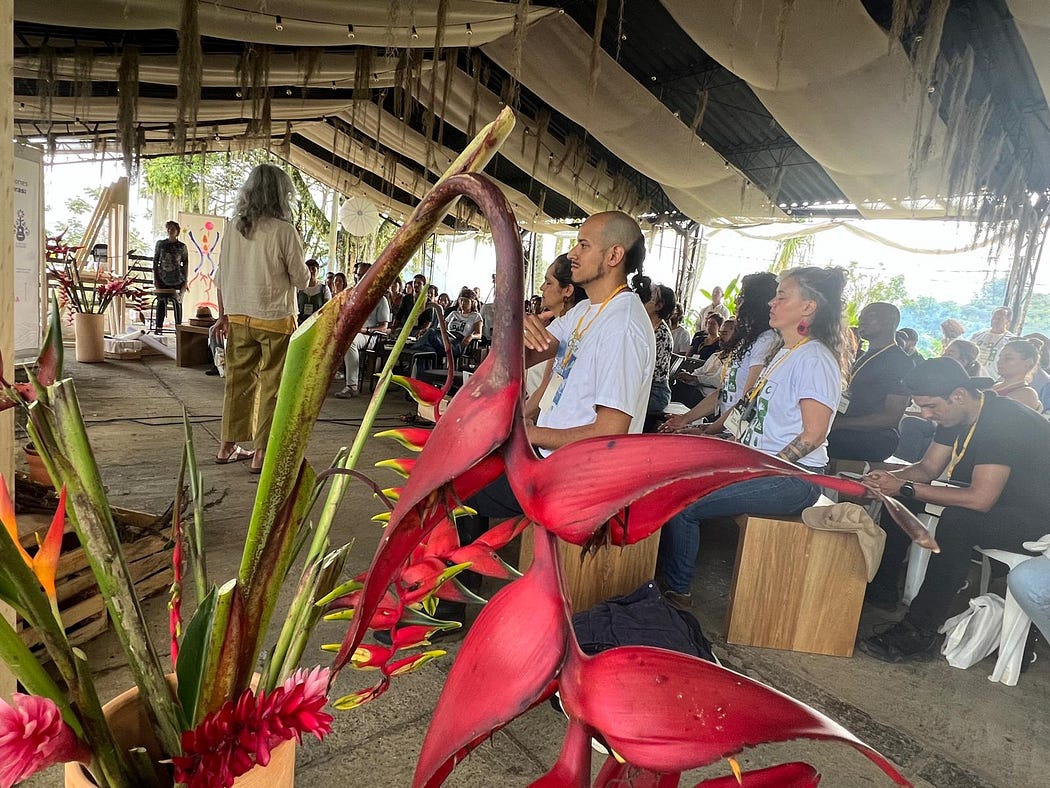
Venecia, Antioquia (Colombia): Weaving Regenerative Cultures

Colombia cont: Dialogue On Regeneration & Transformation in the Face of Violence and Trauma
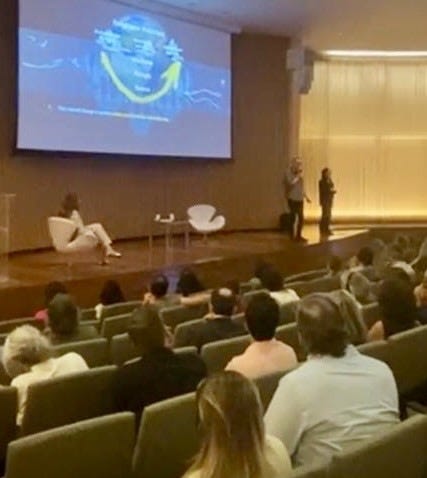
Rio: G20 Pre-Opening, Museum of Tomorrow
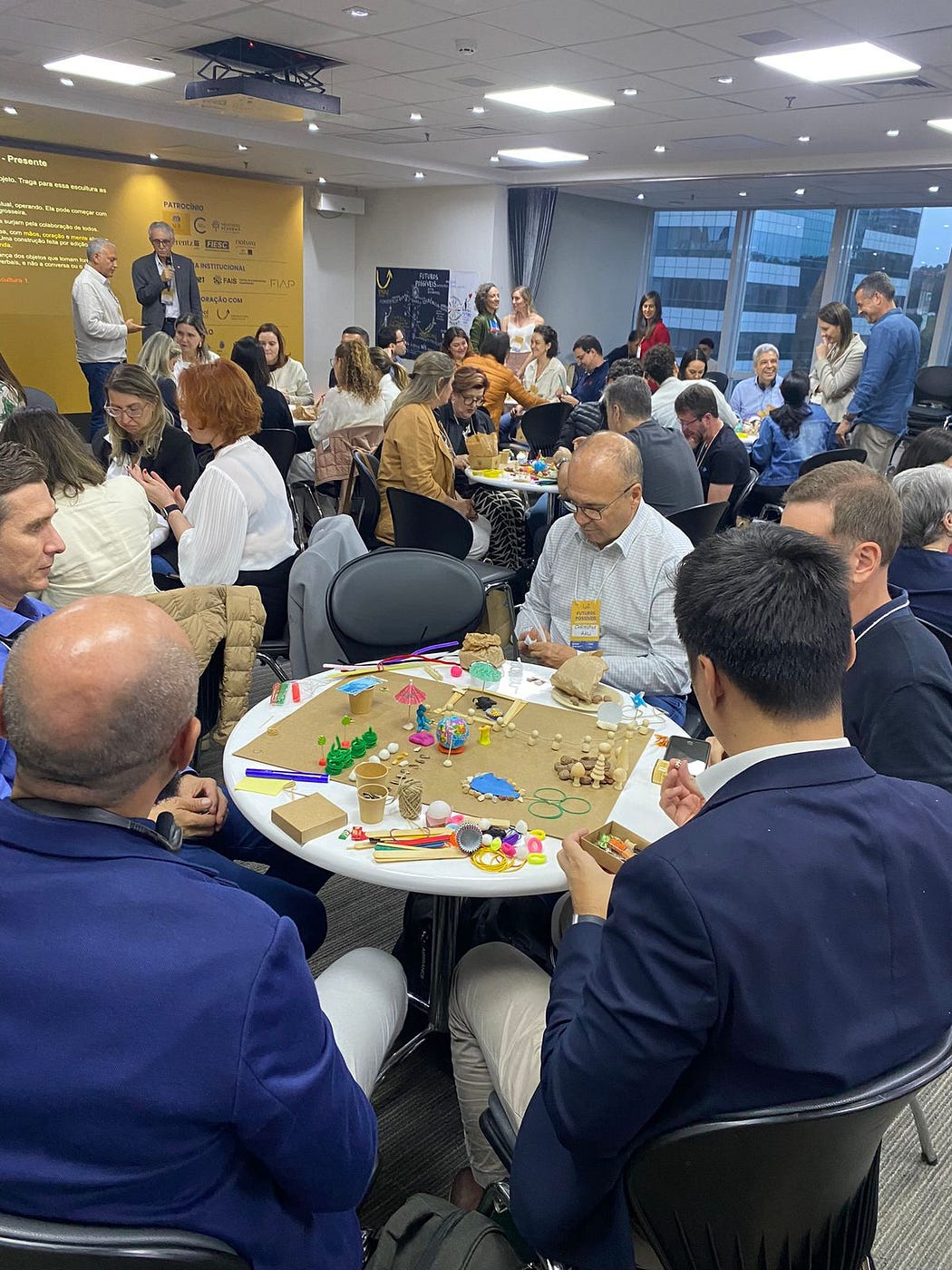
Sao Paulo: Systems Mapping @ Emerge Brazil (National Confederation of Industries
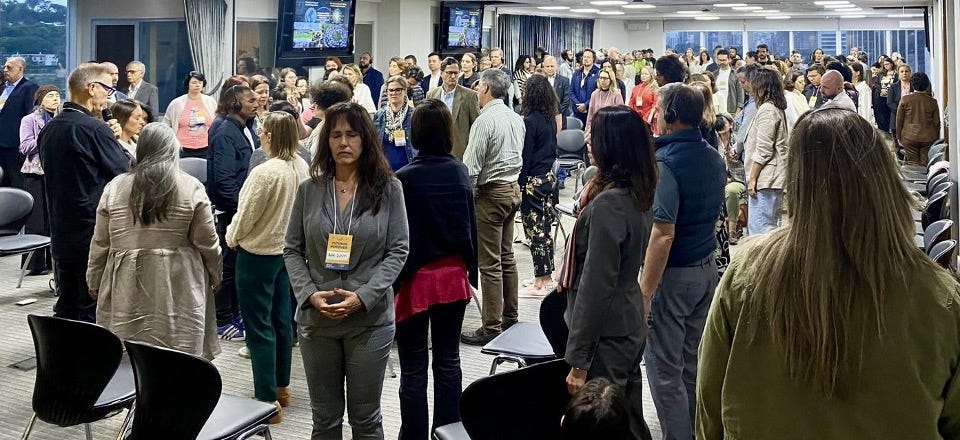
Sao Paulo: Stepping Into the Field of the Future, Emerge Brazil (200 participants
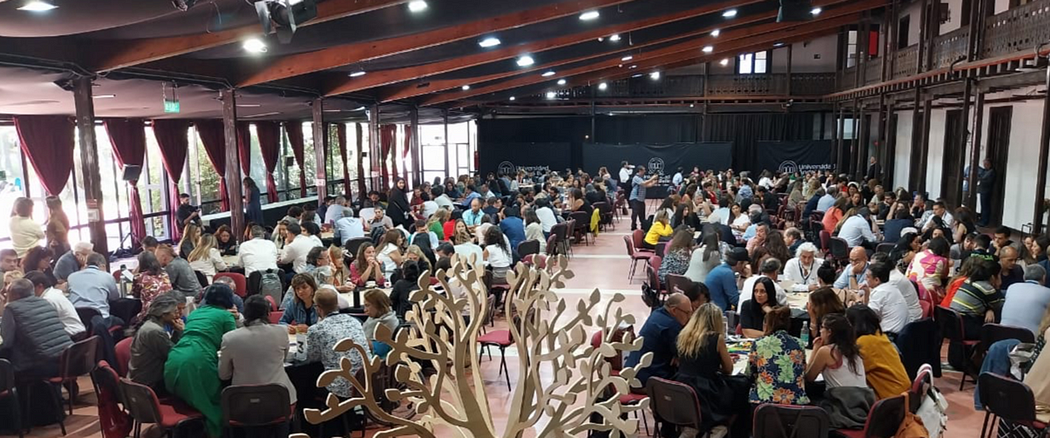
Emerge Chile: 380 leaders across sectors, 38 tables on 38 specific systems mappings (2024)
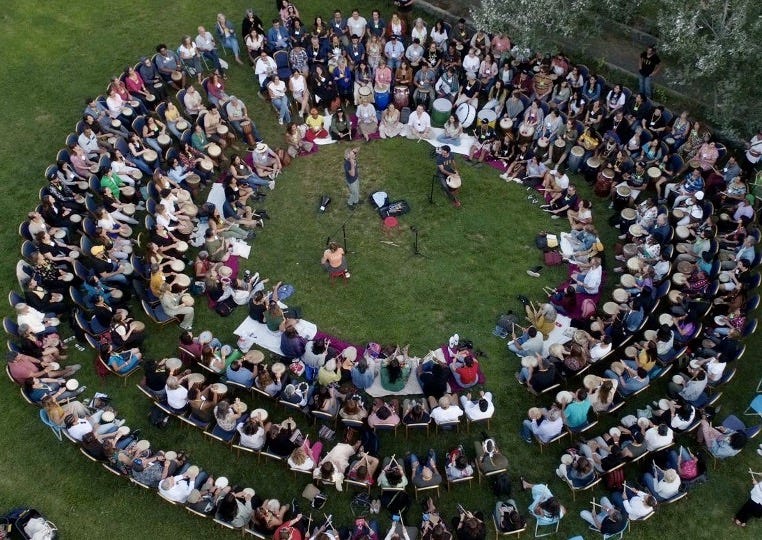
Ecosystem Leadership Program LATAM: 270 pax from 17 LatAm countries (2024)

Ecosystem Leadership Program LATAM (2024)
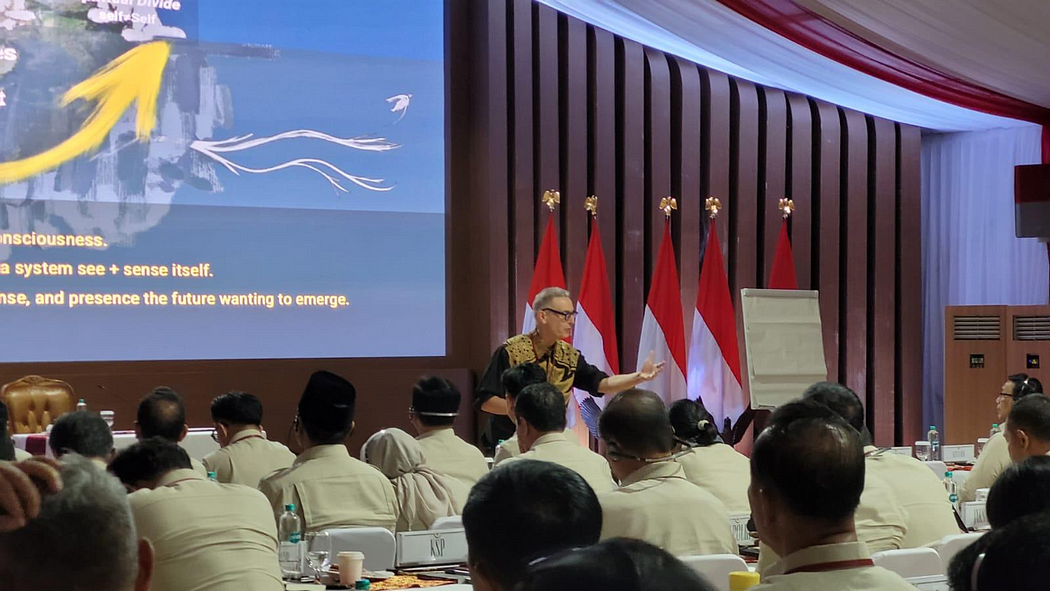
First Cabinet Retreat with the Newly Sworn in Cabinet of Indonesia (2024)
Our work at the Presencing Institute has focused on making connections and developing agency across sectors and systems, but it can also be effective in business ecosystems. For example, last year we worked jointly with the top 80 leaders of a global business group headquartered in Europe. The stated purpose of the group, “business as a force for good,” was strengthened through a structured process of connecting these leaders across business and regions with each other, with their deeper sense of individual and shared purpose, and with the planetary threshold situation that we face in this current moment.
What I have learned from all these experiences is this: in the current context of polarization and absencing, it takes a lot more intentional effort and energy to hold the space for the activation of an entire ecosystem. But when you do, the results can be much faster and much more significant. At the Presencing Institute, we have decided to put all our energies into creating these kinds of enabling conditions, both in terms of tools and in terms of places and practices that cultivate, activate, and support these ecosystems as they emerge.
7. Islands of coherence can catalyze individual and collective agency
The third barrier that for example our participants in u-lab tell us is holding them back, is fear. How can we stengthen the capacity to tap into our unconditional courage, into our true sources of “action confidence”? Fighting the power of fear by confronting it head-on usually doesn’t quite work. What does work is a) creating safe containers that allow people to open up to each other and connect, and b) tapping into a deeper sense of purpose and passion that simply makes the fear factors fading away. The more we tap into what we believe matters most, the more the disabling fear-based environment begins to fade away.
Social Fields As Prototypes For New Societal Operating Systems
Islands of coherence in organizations can be small and seemingly insignificant, or they can be large. They can be at the edges of the system, at the top of institutions, on the frontlines, or in middle management. They matter wherever they are. They may be place-based, local, or regional. They all embody a new DNA for business, for governance, and for learning and leadership.
That said, what are the bold initiatives that we need to launch in order to move from extraction to regeneration, from ego to eco, and from reactive patterns (driven by the past) to co-creative patterns that channel and embody the emerging future?
I believe we need to upgrade at least three of our major societal systems: our economies, our democracies, and our learning systems:
- Our economies need to shift from running on ego-system to eco-system awareness
- Our democracies and governance systems must break their gridlock to become more dialogic, data-driven, distributed, and direct
- Our learning systems must change from teaching for testing toward education for human flourishing in ways that activate our deep capacities for co-sensing and co-creating the emerging future (which is a multi-country initiative that we at the Presencing Institute are just launching with the OECD and their high performing educational systems group).
In other words: we need more than just another app or policy. Our entire operating system needs to be regenerated and rebooted. That is exactly what happens when successful islands of coherence are prototyped, explored, and scaled to generate ecosystems of coherence. The result is a profound renewal and transformative change that is grounded in the alignment of our shared attention and intention.
To advance these profound societal shifts we need to cultivate the social soil. And just as the farmer needs a plow and other tools to cultivate the soil of the land, the social change maker and leaders need social leadership tools that cultivate the social soil. They entail:
- Becoming aware: bending the beam of attention back onto ourselves
- Generative listening: listening with your mind and heart wide open
- Generative dialogue: making systems sense, see, and change themselves
- Presencing: deep sensing by meeting the highest future in the moment, in the now
- Co-imagining: clarifying the future that we want to create
- Co-creating: exploring the future by doing
- Ecosystem governance: organizing around common intention and shared attention
In short — the key to the profound changes that our current polycrisis is calling for lies in the cultivation of the social soil. Every one of us can be (and is) a gardener or farmer of that soil. In our forthcoming book Presencing we outline the core practices for doing so.
In my next blog I will build on the above further to explore the three scenarios and possible pathways that I have been discussing above:
- Status quoism: more of the same, capitalism & democracy as we know it
- Neo-feudalism: few platforms of Silicon Valley oligarchs who own the US government and rule the world
- Leaning into the Emerging Future: organizing around shared intention, planetary healing and societal regeneration
Each pathway is supported by current evidence. The direction we choose will depend on all of us, individually and collectively.
I thank Becky Buell, Ditri Zandstra, Eva Pomeroy, Janine Saponara, Katrin Kaufer, Laura Pastorini, Martin Kalungu-Banda, and Patricia Bohl for their helpful feedback on the draft.
If you want to check out further resources: Presencing Institute, u-school.org, ottoscharmer.com, Journal of Awareness-Based Systems Change
References
Scharmer, C. O., & Kaufer, K. (2025). Presencing: Seven Practices for Transforming Self, Society, and Business. Berrett-Koehler Publishers.
Mayer, J. (2016). Dark Money: The Hidden History of the Billionaires Behind the Rise of the Radical Right. Doubleday.
Scharmer, C. O. (2018). The Essentials of Theory U: Core Principles and Applications. Berrett-Koehler Publishers.


